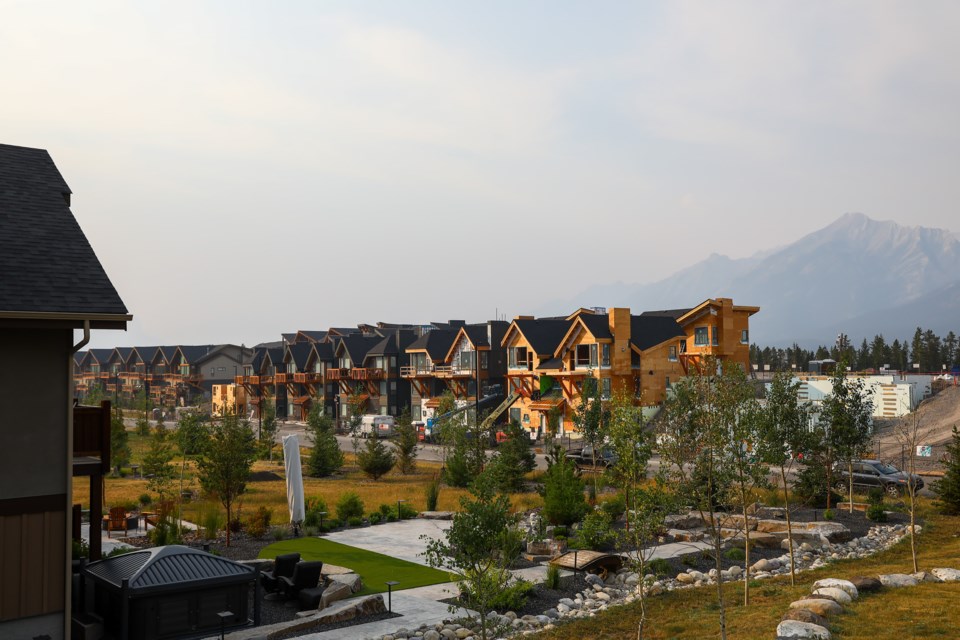CANMORE – Three organizations were given limited intervenor status in the ongoing hearings between the Town of Canmore and Three Sisters Mountain Village Properties Limited, a provincial tribunal ruled.
The Land and Property Rights Tribunal (LPRT) granted the Natural Resources Conservation Board (NRCB), Yellowstone to Yukon Conservation Initiative (Y2Y) and the Stoney Nakoda Nation the status to participate in the upcoming merit hearing between TSMVPL and the Town.
However, all three groups will only be able to make submissions on limited points and are not able to ask questions of either the Town of Canmore or TSMVPL.
The 14-page decision report provided limited intervenor status for the three groups, rejected the jurisdictional review argued for by the Town with Section 619 not existing when the NRCB decision was made. It also approved the Smith Creek and Three Sisters Village ASPs being heard in separate merit hearings early next year.
“We’re happy to see the tribunal ruling on this so we can move forward as we prepare for the hearing in February,” said Robyn Dinnadge, the Town of Canmore manager of communications.
TSMVPL declined comment due to the ongoing nature of the LPRT hearings.
The NRCB requested to be an intervenor for any interpretations concerning the NRCB Act and any remedy that impacts the NRCB. Its submission noted it had no issues and were only doing so out of precaution and to be able to clarify its role.
The Stoney Nation was permitted to make submissions on how the ASPs and the NRCB decision are interpreted given changes since 1992 and how the changes may impact the ASPs.
Y2Y is permitted to make submissions in regards to the provincially approved wildlife corridor and its consistency with the NRCB approval.
While being granted intervenor status is a success, the inability to ask questions of either TSMVPL or the Town, and being limited to specific submissions, makes them glorified spectators to the merit hearing.
In its decision, the tribunal noted Section 619 appeals are meant to be heard “expeditiously and without delays from lengthy submissions from numerous parties.” However, the NRCB Act doesn’t stop intervenors from participating.
“The LPRT finds it appropriate to receive very limited submissions from the three groups who have applied for intervenor status,” the decision report stated.
The tribunal emphasized the NRCB is best suited to help with points of clarification, while Y2Y and the Stoney Nations each have “unique expertise and perspective” and could help in making a decision. But that the “LRPT will determine the appropriate weight to be placed on any submissions made.”
The tribunal also stressed it does not have the ability to decide issues on constitutional law, which was raised in the Sept. 30 preliminary hearing.
The LPRT also decided the two ASPs will be heard sequentially, as opposed to concurrently as the Town had requested.
“The two ASPs are different and will require individual analysis, but both are subject to the issue before the LPRT – specifically, consistency with the NRCB approval. Therefore, it is likely there may be certain elements in common between the two appeals, and it would be more efficient to have them heard sequentially by the same panel to avoid duplication and repetition,” the tribunal decision stated.
The decision will see the Smith Creek ASP heard first over the course of two weeks followed by the Three Sisters Village ASP in the span of two weeks.
The three-person tribunal board heard the arguments of all sides and intervenors Sept. 30. The three-hour preliminary hearing had more than 4,000 pages of submissions ranging from the two ASPs to submissions by each of the three intervenors. The merit hearing is likely to begin in February, the decision report noted.




